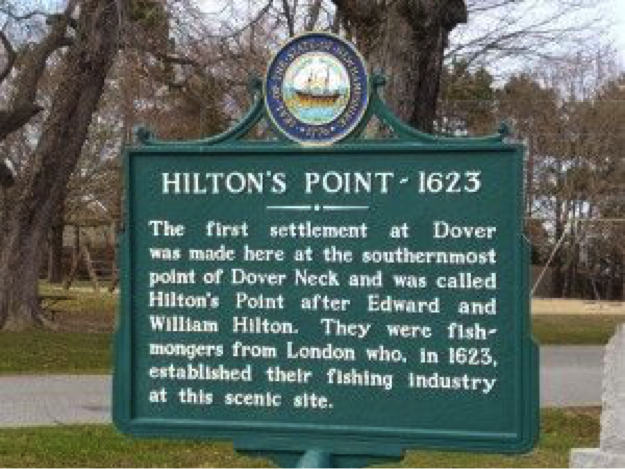New Hampshire’s Founding Father – William Hilton
In November 1621, thirty-five colonists on the ship Fortune arrived in Plymouth from England. According to their published accounts, “they found the (Plymouth) settlers in very low condition – many were ragged in apparel and some little better than half naked. The best dish they could offer their friends was a lobster or a piece of fish without bread or anything else but a cup of fair spring water” It is believed that the timely arrival of Fortune ensured the future of the first settlement at Plymouth.
On board the Fortune was my 10 great-grandfather, William Hilton. Below is a letter that William Hilton wrote to his cousin Anthony Hilton of South Shields, England after arriving in New England.
Loving Cousin,
At our arrival at New Plymouth, in New England, we found all our friends and planters in good health, though they were left sick and weak, with very small means; the Indians round about us peaceable and friendly; the country very pleasant and temperate, yielding naturally, of itself, great store of fruits, as vines of divers sorts, in great abundance. There is likewise walnuts, chestnuts, small nuts and plums, with much variety of flowers, roots and herbs, no less pleasant than wholesome and profitable. No place hath more gooseberries and strawberries, nor better. Timber of all sorts you have in England doth cover the land, that affords beasts of divers sorts, and great flocks of turkeys, quails, pigeons and partridges; many great lakes abounding with fish, fowl, beavers, and otters. The sea affords us great plenty of all excellent sorts of sea-fish, as the rivers and isles doth variety of wild fowl of most useful sorts. Mines we find, to our thinking; but neither the goodness nor quality we know. Better grain cannot be than the Indian corn, if we will plant it upon as good ground as a man need desire. We are all freeholders; the rent-day doth not trouble us; and all those good blessings we have, of which and what we list in their seasons for taking. Our company are, for the most part, very religious, honest people; the word of God sincerely taught us ever Sabbath; so that I know not any thing a contented mind can here want. I desire your friendly care to send my wife and children to me, where I wish all the friends I have in England; and so I rest. Your loving kinsman, William Hilton

In 1623, two
more ships, the Anne and the Little James, arrived carrying some 90 new
settlers, including William’s his wife, son and daughter. In 1623/4, William
and his family (including his brother Edward) left Plymouth and relocated to
would later be known as Dover, New Hampshire. They were the first
non-natives to settle in this region. William and his brother are often
referred to as the founding fathers of New Hampshire. By 1648, he had moved
approximately 11 miles to Kittery, Maine where he is listed as a tavern keeper
and a ferry operator. “Mr. William Hilton, being licensed for to
keep the ordinary (tavern) at the mouth of the river of Pascataquack and that
none other shall keep any private ordinary there, nor to sell wine, beer nor
liquor upon any pretense.” A year later he was admonished for
not keeping “victual and drink at all times for strangers and
inhabitants.” William died in in 1656 in York, Maine.
Side note: On the return journey the Fortune was captured by French
pirates in the English Channel who pilfered the hold of all the goods.
However, the pirates did not take or destroy the settlers letters. One of
those letters contained the only account of the Pilgrims’ first Thanksgiving
dinner! (Letter from Edward Winslow 11 Dec 1621)
Part II of
this post will focus on the exploration of the Carolina’s by William’s son who
had a head for navigation.